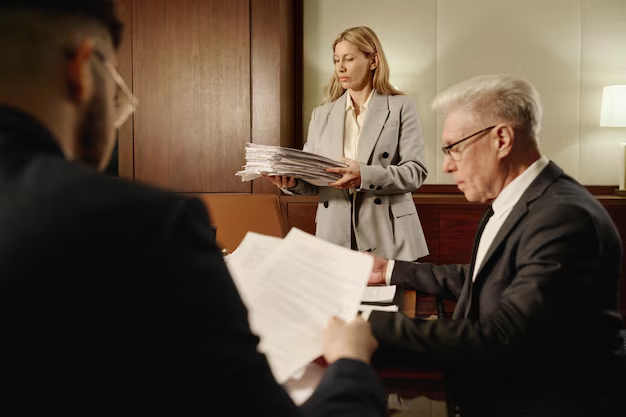Can Felons Serve on a Jury? Unpacking the Rules and Realities
Jury duty is a civic responsibility that many citizens will encounter at some point. It’s a vital cornerstone of the justice system, ensuring fairness and community participation in legal proceedings. But a common question arises when discussing eligibility: Can felons do jury duty? This question isn't just about who gets to decide a community's legal outcomes; it's also about understanding one's rights after serving time. Let's dive into the specifics of this topic, highlighting different perspectives and implications for those involved.
Understanding Jury Duty
Jury duty is an obligation and right that comes with citizenship. It is an opportunity for individuals to contribute to the judicial process. Juries help determine the outcome of trials by evaluating evidence presented and deciding on the innocence or guilt of a defendant. Given the power and influence juries hold, it's important to explore who can serve and under what conditions.
Eligibility Requirements for Jury Duty
Before we get into the specifics for felons, let's look at general eligibility criteria for jury duty:
- Age: Typically, jurors must be 18 or older.
- Citizenship: Jurors must be citizens of the country.
- Residency: Jurors must reside in the jurisdiction where they are called to serve.
- Proficiency in English: Jurors must have a sufficient understanding of the English language.
- Mental and Physical Capability: Jurors should not have disqualifying mental or physical conditions.
- No Recent Jury Service: Individuals often cannot serve on a jury if they've recently completed jury duty, usually within the past year.
Now, let's explore how these general criteria interact with felony convictions.
The Impact of a Felony Conviction
When it comes to jury duty, the effects of a felony conviction vary widely across jurisdictions. Whether or not a felon can serve on a jury largely depends on where they reside, due to different state and federal rules.
Federal vs. State Rules
Federal Court: Generally, federal law disqualifies felons from serving as jurors in federal courts. However, this can change if their civil rights, including the right to serve on a jury, are restored after completing their sentence.
State Courts: Policies can vary significantly between states. More restrictive states permanently disqualify felons from jury duty, while some allow participation once rights are restored.
Examples of State Variations
- California: In California, felons are prohibited from serving on a jury unless their rights have been restored.
- Florida: Similarly, Florida also bans felons from jury duty unless their civil rights are reinstated.
- Oregon: Interestingly, Oregon allows felons to serve once they've completed their sentence, including parole and probation.
Given the diversity in regulations, it's essential to understand the specific laws in your state.
Restoring Rights and Pathways for Participation
Restoring rights after a felony conviction can be a crucial step in regaining access to full civic participation, including serving on a jury. Here are pathways one might explore:
Pardon or Expungement
A pardon or expungement can sometimes restore a felon's rights, depending on the state. These processes can nullify the legal effects of a conviction:
- Pardon: A government official, like a governor, can pardon a conviction, effectively forgiving the crime.
- Expungement: This involves sealing or erasing records of the offense, potentially restoring certain legal rights.
Automatic Restoration
In some states, rights automatically return once a felon has completed their sentence and other associated penalties, like probation or fines.
Applying Through Courts
Some regions require individuals to actively apply for rights restoration, often necessitating a lawyer's help. This approach can be more timely and require additional paperwork and fees.
🔍 Summary of Restoration Pathways:
- 📝 Pardon: Clears record, state-dependent.
- ✂️ Expungement: Seals record, specific to jurisdictions.
- ⚖️ Automatic: Returns post-sentence, varies by location.
- 💼 Court Application: Requires formal process and legal aid in some areas.
The Broader Impacts of Felony Disenfranchisement
The rules that restrict felons from serving on a jury impact more than the individual; they shape the very fabric of the jury pool. Felony disenfranchisement contributes to the underrepresentation of certain communities, particularly minorities, in jury service. This underrepresentation can skew trial outcomes and stymie community trust in the justice system.
Social and Civic Reintegration
Felons face numerous hurdles when rebuilding their lives post-conviction. Civic duties like voting and jury service symbolize full membership in society. Allowing felons, especially those who’ve demonstrated rehabilitation, to serve can foster inclusivity and diverse perspectives within the court system.
Conclusion
The question of whether a felon can do jury duty underscores larger societal debates about justice, rehabilitation, and civic responsibility. Rules differ across jurisdictions, but the trend suggests a gradual reevaluation of how past mistakes define one's capabilities and contributions to society. For felons eager to participate in civic duties, understanding local laws and potential rights restoration pathways is critical.
Encouraging Inclusion and Diverse Perspectives
In the end, the inclusion of reformed individuals in jury duty doesn't just empower the individual; it enriches the justice process and reflects a society that believes in second chances and rehabilitation. By understanding and addressing the complexities of this issue, we forge a more inclusive path forward.

Related Topics
